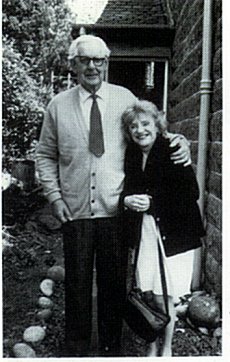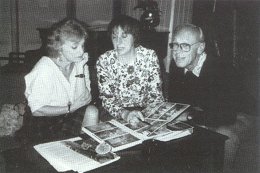"The Uprooted"
A psychologist draws on her own experiences
to gather the stories of those who fled the Nazis
("The Jewish Journal" - April,
1994)
By Naomi Pfefferman, Senior Writer
Dorit Bader Whiteman is not a concentration-camp survivor.
For much of her life she did not consider herself part and
parcel of the Holocaust, though she is Jewish, was born in
Austria and lived there through most of the 1930's. But her
parents had the wisdom and/or good fortune to flee the Nazis in
1938, and Whiteman found herself an escapee rather than a
concentration-camp inmate.
Four years ago she set out to discover what had happened to
others, like her, who had fled the German nightmare and landed
safely on some shore that eventually became home. Most of these
fellow escapees had also believed it was "immodest to talk
about what happened to you compared to the camp (victims)."
Nor were there any existing studies of these refugees. So
Whiteman embarked upon a study of her own, "What Happened
to Those to Whom 'Nothing Happened at All,'" and the result
was a critically acclaimed book, The Uprooted: A Hitler Legacy,
which has recently ranked high on academic bestseller lists.

John
Guthrie -- "the gentle giant" who fixed the shoes of
orphaned Jewish children who were evacuated to Scotland -- gives
the author a bear hug.
The psychologist's timing could not have been better. She
approached 190 refugees from Israel to New Zealand, who like
Whiteman had been too busy building families and careers to
think much of the past but who now had begun reminiscing about
faces and places long gone. "The book became a mission for
me," said the soft-spoken New York author, who gave up her
Health Clinic's psychology department to immerse herself in
research. "The world didn't know what had happened to the
escapees, and I felt their story should be told."
The psychologist's own memories came rushing back as she sat
at her computer. She had grown up in a comfortable home in
Vienna, her father a physician, her mother a chemist and the
proprietor of a renowned girls' boarding school. But upon the
Nazi invasion Whiteman's family was forced to race to London
with just a few suitcases in tow. Whiteman was eventually
evacuated from her Kent boarding school to a primitive
bricklayer's house before moving to New York with her parents in
1941. There they all eagerly became Americans, but the price, of
course, was one more uprooting.
|

|
 |

|


Dorrith
Sim (center), a member of the Kindertransport, shows her
childhood pictures to the author and the author's husband.
"The feeling of having lost something came
much later, as I went to weddings and funerals and realized how
few relatives I had," Whiteman said. "It came when I
finally returned to Vienna, and realized what I might have
had."
Like the other escapees she stood outside her old
European home and retraced the path to school. "My nostalgic
feelings were mixed with tremendous anger and hostility," she
said. "My mother's boarding school was now run by the state,
and I recognized the paintings and grand piano, now shabby and
neglected. Waves of sadness came over me at the ice cream parlor
across the way; there were the same mirrors, the same small
tables, but most of the children who had noisily crowded the place
were either scattered or dead."
Whiteman, who felt the loss even more vividly when her
daughters left home, discovered an "immediate bond" with
the fellow escapees she interviewed. There was Ruth Michaelis, who was severely
beaten for bed-wetting in her foster home. There was Ruth Wesson,
once part of a strange children's commune in a drafty Welsh
castle, without furniture, toilets, running water or adult
supervision. There were refugees who lived in poverty in Shanghai;
who scratched a living from the rocky soil in the remote mountains
of Ecuador; who were shipped as "enemy aliens" to the
dusty Australian interior.
What they shared, Whiteman found, was a sense of always being
the "assimilated outsider" -- different but in no way
inferior. Rather, overcoming the odds had brought feelings of
self-worth, though many had heightened awareness of the
unpredictability of things and were wrenched by even casual
goodbyes. Whiteman, for one, is "intensely moved by the
innocence of children"; at her daughter's school plays she
found herself staring at the ceiling so tears did not run down her
cheeks, for the earnest scrubbed faces reminded her of the youths
"who were oh so good�(but reaped) something most
terrible."
Yet the psychologist was surprised to discover that while
escapees felt grief or anger about the Holocaust, they did not
have the expected survivor's guilt (perhaps because they had had
less proximity to the dying). This claim was so controversial, she
said, that colleagues warned it could damage her reputation.
"It was also striking to me that (escapee) children did
not confide much to each other about the pain of separating from
their parents; it was better to have a certain amount of denial in
order to function," she continued. "Today the popular
idea is that (youngsters) must always be encouraged to talk about
their trauma, but I now believe it's better to let that go, in
some cases, until the child is older and stronger."
Whiteman added that the highly functional escapees have another
message for contemporary psychologists, as they counsel refugees
from Bosnia and Central America. "We must keep in mind a
brighter future for these people," she said. "The
ability to recover is enormous."
|

